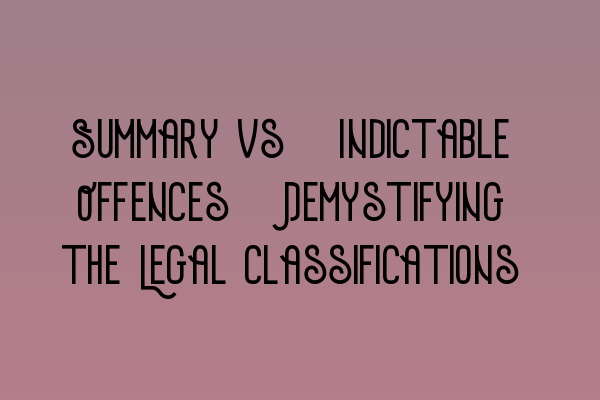Summary vs. Indictable Offences: Demystifying the Legal Classifications
Welcome to the SQE Criminal Law & Practice blog! Today, we will be diving into the fascinating world of criminal law and exploring the key differences between summary and indictable offences. Whether you are a law student, legal professional, or simply have an interest in the legal system, this article is for you!
Understanding Legal Classifications
In criminal law, offences are categorized into different classes based on their severity and complexity. This classification helps in determining the appropriate procedure and level of court where the case will be heard.
There are mainly two classifications of criminal offences in the UK: summary offences and indictable offences. Let’s take a closer look at each one:
Summary Offences
A summary offence is a less serious criminal offence that is usually tried in a magistrates’ court. These offences include various minor offences such as petty theft, public disorder, traffic offenses, and some types of assault.
The key characteristics of summary offences are:
- They are less serious in nature
- Maximum penalty is usually limited to a fine, community service, or a short prison sentence of up to 6 months
- Trials are heard by a magistrate or a panel of magistrates
If you are interested in practicing criminal law, preparing for the SQE 1 exam, or simply looking for some practice questions, check out our article on SQE 1 Practice Exam Questions for comprehensive resources.
Indictable Offences
Indictable offences are serious criminal offences that are usually heard in a higher court, such as the Crown Court. These offences include murder, rape, robbery, fraud, and other major criminal acts.
The key characteristics of indictable offences are:
- They are more serious in nature
- Penalties can range from fines to lengthy prison sentences, depending on the severity of the offence
- Trials are held before a judge and jury
If you are planning to take the SQE 2 exam and need help with your preparation, we offer comprehensive SQE 2 Preparation Courses to enhance your understanding and boost your chances of success.
Differences Between Summary and Indictable Offences
Now that we have a basic understanding of the two classifications, let’s compare summary and indictable offences based on various factors:
Severity
One of the key differences between summary and indictable offences is the level of severity. Summary offences are considered less severe and involve minor criminal acts, whereas indictable offences are more serious and involve major criminal acts.
Penalties
Penalties for summary offences are generally limited to fines, community service, or short prison sentences, whereas indictable offences can result in hefty fines and long prison sentences.
Court Procedure
Summary offences are usually tried in magistrates’ courts, where a magistrate or a panel of magistrates hears the case. On the other hand, indictable offences are tried in higher courts, such as the Crown Court, where the trial is presided over by a judge and jury.
If you want to stay up to date with the latest SQE exam dates and important information, make sure to check out our article on SRA SQE Exam Dates.
Conclusion
Understanding the differences between summary and indictable offences is crucial for anyone involved in criminal law and practice. These classifications determine the appropriate court procedure and level of penalties that can be imposed on offenders.
Remember, if you are preparing for the SQE 1 exam and need some extra practice, our SQE 1 Practice Mocks FLK1 FLK2 can be a valuable resource to test your knowledge and improve your confidence in tackling criminal law questions.
Thank you for joining us on this informative journey through the world of criminal law. We hope this article has demystified the legal classifications of summary and indictable offences, and provided you with valuable insights into the UK legal system.
Stay tuned for more exciting topics on criminal law and practice from SQE Criminal Law & Practice Law UK!
